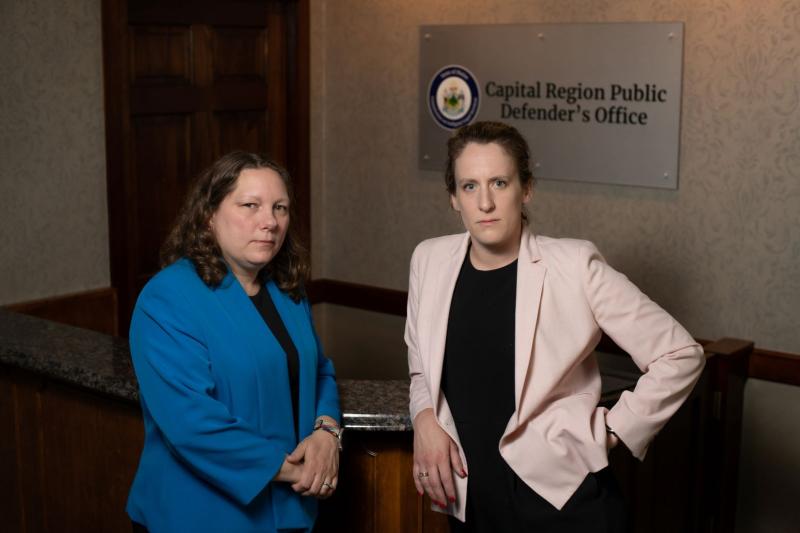Six months in, Maine’s first public defenders’ office talks strategy
Inside the Capitol Region Public Defender’s Office on a sunny morning in late May, five attorneys sat around a table, strategizing. Hillary Knight told her fellow public defenders that if the state couldn’t test substances in a timely manner, they should push for immediate trials.
Their office had recently received a memo outlining a new policy on how substances seized by police would be tested for illegal drugs at the state lab. A backlog had created delays in defense attorneys getting results, evidence they felt they needed earlier to help defend their clients.
“You’re telling me you’re not going to have that witness for a year, then I want a trial tomorrow,” Knight said. The move would likely prompt the state to move for a continuance, but that’s the point. “I want all of the delay in the trial laid at the feet of the state.”
Knight, a Maine native and veteran of the Massachusetts public defender system, was meeting with the four other attorneys who comprise the Capitol Region Public Defender’s Office in Augusta, the state’s first and so far only brick-and-mortar public defender’s office.
The office represents indigent defendants in roughly 360 cases and has taken 600 total cases since opening late last year. It is just one part of a statewide effort to solve Maine’s indigent defense crisis.
At the most recent count, nearly 900 criminal cases were awaiting counsel, with some defendants going a month or more without legal representation. (One defendant can have multiple cases, so the total number of people awaiting counsel is less than the case total).
For the lawyers in the office, their job is about more than just making sure criminal defendants get the legal counsel they are constitutionally guaranteed. It’s about improving criminal defense, and with it, Maine’s criminal justice system.
The Friday morning meeting was something that’s common in other states but new to Maine: public defenders devising ways to counter the institutional and structural advantages enjoyed by prosecutors’ offices in indigent criminal cases.
Frayla Tarpinian, Maine’s first district defender and head of the office, told the room that trying to contest something like the drug test delay on an individual level likely wouldn’t do much.
“Individually, attorneys have very little ability to see patterns and fight this,” Tarpinian said.
But a public defender’s office can see across the system, and over time help craft a process that’s more protective of defendants’ rights.
“I think we are fighting a cultural battle here,” Tarpinian said.
For many years, Maine was the only state without any public defender system to represent clients who couldn’t afford an attorney. Instead the state paid private attorneys on a case-by-case basis.
But that system has failed to meet the state’s need in recent years, with the number of attorneys willing to take indigent criminal cases falling from 421 to 295 between 2018 and 2023, according to the Maine Commission on Public Defense Services.
Meanwhile, a pandemic backlog of felony cases has still not been cleared.
The state launched the Rural Defenders Unit in 2022, a group of five roving attorneys that represented clients in rural areas. The state also raised hourly pay for contracted attorneys in March 2023 from $80 to $150 an hour, but it has done little to stop the bleeding.
Instead the dearth of attorneys has grown and spread into some of the state’s most populated areas. Too few attorneys can mean the ones who are available are overwhelmed, leading to half-hearted representation and burnout that prompts attorneys to leave the field, further worsening the crisis.
Last year, Tarpinian was hired to open the Capitol Region Public Defenders’ office, which serves Kennebec and Somerset counties. The legislature has appropriated funding to open four more offices in Bangor, Caribou, Ellsworth and Lewiston.
The offices should be operating and taking cases by the end of the year, said Jim Billings, executive director of the Maine Commission on Public Defense Services (which until recently was called the Maine Commission on Indigent Legal Services).
Billings said his office hired Toby Jandreau to be the district defender for a new office in Caribou and Logan Perkins for the same role in Bangor.
Tarpinian is well aware that her Augusta office will be used as a blueprint for the others.
“I feel pressure to make sure this office is successful,” Tarpinian said. “I want to see a robust, healthy system for public defense in Maine.”
Kennebec County District Attorney Maeghan Maloney, Tarpinian’s former boss, has long advocated for a public defender’s office, she said. Maloney, also the president of the Maine Prosecutors’ Association, praised the new office, even if it has created more work for her staff.
“The public defender’s office is challenging pieces of a criminal investigation that haven’t been challenged before,” Maloney said. “And that is healthy for our criminal justice system.”
Maloney agreed the wait for results from the state lab “has been inexcusably long for a very long time,” noting the fault lies not with the lab, which operates within the Department of Health and Human Services, but a lack of attention and funding from the state.
“Now that we have the public defense office pushing back on how unfair it is that their clients have to wait for these results, maybe the state will be pushed to finally look at the lab and to give it the adequate resources that it needs to do its job,” Maloney said.
“It’s a really good example of what happens when you take a more comprehensive look at something instead of simply case by case.”
‘Surely a lawyer should help him?’
On May 31, the federal Ninth Circuit Court of Appeals upheld a lower court decision mandating that Oregon, which had a backlog of more than 2,500 unrepresented criminal defendants earlier this year, must release people from custody — “subject to reasonable conditions” imposed by a judge — if they aren’t provided an attorney within seven days.
In his majority opinion, Ninth Circuit Judge John Owens described the situation in Oregon as a “Kafkaesque scene.”
“The state arrests a citizen and incarcerates him pending trial,” Owens wrote. “Days, weeks, and months pass without any legal representation. He seeks relief from the authorities — surely a lawyer should help him? In response, he gets a shoulder shrug, a promise that they are ‘working on it,’ and nothing more. He remains in jail, without legal counsel or any relief in sight.”
“You might think this passage comes from a 1970s State Department Report on some autocratic regime in the Soviet Bloc,” Owens wrote. “This is the State of Oregon in 2024.”
A similar situation is playing out in Maine.
In 1963, the Supreme Court unanimously ruled that the constitution gives a person accused of a crime the right to an attorney, even if they can’t afford one. But in recent years, shortages of indigent defense attorneys in several states have raised the issue of how long criminal defendants — who are presumed innocent — must wait, sometimes in jail, before receiving an attorney. Most are out on bail.
However, the Supreme Court has never mandated a timeline for a state to provide a defendant with counsel. It has never had to, because for the most part criminal defendants have received timely representation, said Carol Garvan, legal director for the ACLU of Maine.
“Unfortunately for Oregon, and I think for Maine, we’re in a somewhat new world,” Garvan said.
Because of the crisis, Maine courts now hold seven-day review hearings that allow defendants without attorneys to appear before a judge after every week in custody. During those hearings, defendants get an “attorney for the day.”
On June 13, the Caribou District Court held such a hearing. Defendant Logan Grant appeared by Zoom from Aroostook County Jail, where he’d been held for three weeks and still didn’t have counsel. Grant was there because he allegedly violated probation and bail conditions.
Attorney for the day Neil Prendergrast argued that Grant’s Sixth Amendment rights were violated, citing the 9th Circuit’s decision, and asked he be released on $500 bail.
Judge Ron Langner disagreed. He didn’t think Grant’s time without an attorney was long enough to count as a constitutional violation.
“But we’re getting darn close to that line,” he said.
In 2022, the Maine ACLU sued the Maine Commission on Indigent Legal Services (since renamed Maine Commission on Public Defense Services) on behalf of criminal defendants unable to access counsel.
The problem has grown dramatically since then. Since October 2023, the number of cases without an attorney has increased by more than 1,250 percent, from 66 to 893, according to court data.
Prompted by that increase and the decision by Maine Superior Court Judge Michaela Murphy to reject two proposed settlements, the Maine ACLU has moved to expand the list of defendants to include Attorney General Aaron Frey, the state of Maine and the state’s sheriffs responsible for holding defendants in county jails.
The court is still weighing the ACLU’s motion to add Maine and its sheriffs to the suit, but discovery for a trial is scheduled to begin in September.
Clifford Neville III is one of the defendants highlighted in the ACLU’s latest legal filings. Neville was arrested in late April, but as of May 31 was being held at Two Bridges Jail in Wiscasset and still did not have a lawyer, according to an amended complaint filed by the ACLU.
Police said Neville, who was out on bail at the time, assaulted a Holden store employee after she tried to stop him from leaving without paying for items, and then stabbed another customer with a used needle after several customers intervened.
Neville is still without an attorney and facing charges that include theft, robbery and violating conditions of release, according to a June 12 list of indigent defendants awaiting attorneys maintained by the Administrative Office of the Courts.
His charges are in Penobscot County, which had 340 cases in need of a lawyer as of June 12, more than any other county. In contrast, Kennebec and Somerset Counties, the two served by the Capitol Region Public Defender’s Office, had a combined total of just two cases.
While Garvan supports the new public defenders’ offices, she doesn’t view them as a comprehensive fix.
States with established public defender offices face similar struggles. Washington funds its public defender offices at the county level but faces an attorney shortage as costs climb. Wisconsin’s public defender shortages helped create a backlog of 35,000 cases and prompted an ongoing class action lawsuit. Mississippi’s legislature recently rejected reforms to its public defender system, despite instances in which defendants were locked up for more than a year without counsel.
Ultimately, it’s up to those who control the purse strings to ensure the criminal justice system has the resources it needs to function, said Malia Brink, senior policy attorney at the Deason Criminal Justice Reform Center at Southern Methodist University Law School.
“At the end of the day, the legislature and the governor have to craft a budget that actually adequately funds the defense for whatever prosecution they want to have happening in the state,” Brink said. “Our adversarial system hinges on that defense lawyer.”
Ruffling feathers
The decision to open the state’s first public defender’s office in Augusta was partly due to the central location and its proximity to lawmakers. But mostly it was because the state had office space near the statehouse, Billings said.
When the state initially moved people into an old farmhouse on the capitol complex, however, they realized there wasn’t enough room. There was a risk the upstairs floors could collapse.
Eventually, space opened up in an office building on Sewell Street. When a Monitor reporter visited in late May, the public defenders discussed strategy on what appeared to be a structurally sound third floor. Since they were talking general strategy, no one was billing the state or a client for their time. It’s the kind of thing that can happen only because all the attorneys are on salary.
“You can’t recreate five attorneys just purely doing legal analysis and strategy,” Tarpinian said.
Most of the attorneys had never done criminal defense work before coming to this office. And that’s by design. If public defenders’ offices hired private attorneys who were already practicing indigent defense, the overall capacity for that type of work wouldn’t grow.
The success of Maine’s public defense system depends on attracting attorneys from out of state, attorneys currently working in other areas of law, and new law school graduates who might not be enticed by the prospect of becoming solo practitioners, but are interested in joining an office where they can collaborate with colleagues, get state benefits, work toward law school tuition forgiveness, and have somebody else do the billing and administrative work.
Hillary Knight grew up in Maine and “wanted to be a public defender as soon as I learned there was such a thing,” she said. She attended Smith College in Massachusetts, then went to law school at Northeastern University in Boston, knowing she wanted to pursue public defense but also aware Maine did not have a public defender system.
“In my heart of hearts, I wanted to be a public defender in the woods of Maine,” Knight said.
Instead she practiced in Massachusetts’ public defense system. When she heard Maine was going to open the Rural Defender Unit, she wrote an email to the then-director of Maine’s indigent defense commission, saying, “You don’t know me, but this is the job I’m supposed to do,” she said.
She started the job in late 2021 and began driving across the state representing indigent clients.
Then last year she was one of the Capitol District office’s first hires. But how many attorneys are willing to make a similar move, including to remote places like Caribou, remains to be seen.
Since the Augusta office opened in November, the most common types of cases it has taken have been OUIs, followed closely by drug and domestic violence cases, said Tarpinian. Eventually she hopes to hire a full-time investigator (the office currently contracts with private investigators) as well as a social worker to help support defendants and identify potential issues the court should be aware of, like mental illness.
“It’s our job to highlight that information to make sure that we counter prosecutors who are looking at these sentences and try to mitigate them, and help our clients make the best choice,” Tarpinian said.
Part of their recent Friday morning meeting was spent talking about the need to remind prosecutors that legal motions to sanction the state for failing to provide evidence were not personal.
“My client is entitled to due process and notice of the state’s evidence,” Knight said. “You haven’t given me all of that yet. Motions to suppress aren’t personal.”
Tarpinian said the office’s approach seems to be ruffling feathers.
“Defense attorneys working in concerted efforts together strategically is different, it’s new,” Tarpinian said. “They’ve never had to deal with it before.”
‘We had his back’
In late May, the public defenders’ office won its first trial.
It was the first criminal trial for Dan Lawson, who spent the last decade practicing law for the state in workers compensation and insurance regulation before joining the public defender’s office in November.
Lawson was the only attorney on the case, but he was hardly alone. Tarpinian was there for the entire trial, as were other staff.
“We had his back,” Tarpinian said.
The bench trial involved a traffic accident. A woman drove her car onto a curb at an intersection and badly injured two pedestrians, resulting in a charge of aggravated driving to endanger.
The state argued there was some sort of “distraction event” that led the woman to hit the pedestrians but couldn’t say what it was. Justice Michaela Murphy noted in her decision that there was no evidence the driver was impaired, on her cell phone or experiencing any kind of medical event. Murphy ruled the state couldn’t prove beyond a reasonable doubt that the woman had committed a crime (although the victims could sue her in civil court) and was therefore not guilty.
It’s difficult to say whether a public defender’s office is more likely to take cases to trial than private attorneys. But by doing so, the public defender system can help set the standards for what is an acceptable plea offer, said Billings.
“When you have a public defender system that is not afraid to try cases, and will try cases, and starts to have some success in winning some of those trials, they start to have a say in what is a reasonable plea offer,” Billings said.
District Attorney Maloney noted a difference in how Lawson approached the case.
“Most defense attorneys would have taken a plea deal,” she said.
































